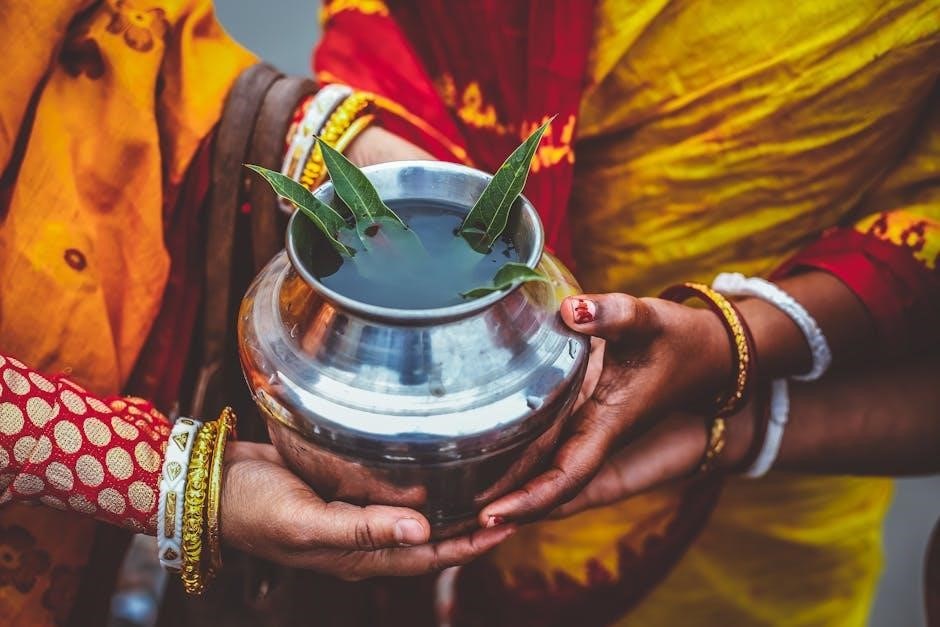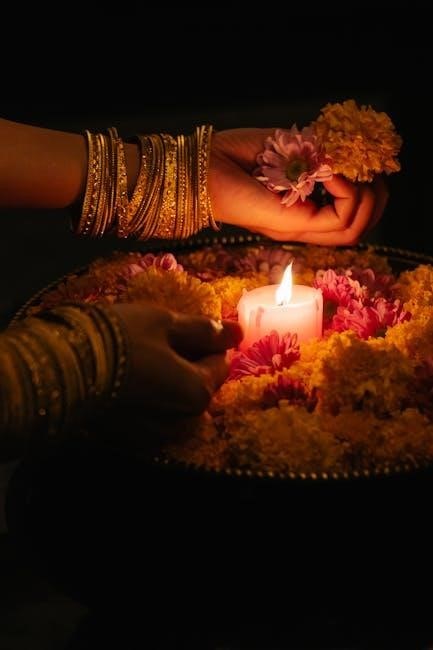a glimpse of indian spirituality pdf
Summary
Explore the essence of Indian spirituality with this insightful guide. Download your free PDF now and delve into ancient wisdom and spiritual practices.

Indian spirituality is a profound journey through ancient texts like the Vedas, Upanishads, and Bhagavad Gita, offering timeless wisdom for self-discovery, inner peace, and spiritual growth.
1.1. Overview of Indian Spirituality
Indian spirituality is deeply rooted in ancient texts like the Vedas, Upanishads, and Bhagavad Gita, offering insights into self-discovery and universal harmony. It encompasses diverse traditions, emphasizing inner peace, mindfulness, and the pursuit of ultimate truth. The essence lies in balancing material life with spiritual growth, fostering a holistic approach to existence. This timeless wisdom continues to inspire global seekers, blending seamlessly with modern interpretations while preserving its core principles.
1.2. Importance of Spirituality in Indian Culture
Spirituality forms the backbone of Indian culture, guiding daily life, social interactions, and personal growth. It provides a moral framework, fostering values like compassion, humility, and self-discipline. Spirituality offers solace during hardships and inspires resilience, as seen in its emphasis on enduring poverty with grace. This timeless wisdom continues to shape modern India, blending tradition with contemporary life and appealing universally to spiritual seekers worldwide.
Core Concepts of Indian Spirituality
Indian spirituality revolves around sacred texts like the Vedas, Upanishads, and Bhagavad Gita, emphasizing timeless principles of Dharma, Karma, and Moksha for spiritual enlightenment and self-realization.
2.1. The Vedas and Upanishads
The Vedas and Upanishads are foundational texts of Indian spirituality, offering ancient wisdom on the nature of existence. The Vedas, composed over 3,000 years ago, contain hymns, rituals, and philosophical discussions, while the Upanishads delve into the ultimate reality, Brahman, and the self, Atman. These sacred texts provide a roadmap for spiritual growth, emphasizing introspection, self-realization, and the pursuit of universal truths that transcend time and culture.
2.2. The Bhagavad Gita and Its Teachings
The Bhagavad Gita, a sacred text within Indian spirituality, presents a dialogue between Prince Arjuna and Lord Krishna. It explores the essence of dharma (duty), karma (action), and moksha (liberation), guiding individuals to fulfill their duties selflessly. The Gita emphasizes three main yogas: Karma Yoga (path of action), Bhakti Yoga (path of devotion), and Jnana Yoga (path of knowledge), offering universal wisdom for spiritual growth and inner peace.
2.3. Dharma, Karma, and Moksha
Dharma refers to righteous living and fulfilling one’s duty, while karma emphasizes the consequences of actions, shaping destiny. Moksha, the ultimate goal, is liberation from the cycle of rebirth, attained through self-realization and detachment. These interconnected concepts guide individuals toward moral living, spiritual growth, and the pursuit of eternal peace, forming the cornerstone of Indian spiritual philosophy.

The Role of Yoga and Meditation
Yoga and meditation are essential practices in Indian spirituality, fostering self-discovery, inner harmony, and a deeper connection to the divine, guiding individuals toward spiritual enlightenment and balance.
3.1. Yoga as a Path to Spiritual Growth
Yoga, an ancient Indian practice, combines physical postures, breathing techniques, and meditation to harmonize the body, mind, and spirit. It serves as a holistic path to spiritual growth, fostering self-awareness, inner peace, and union with the divine. By integrating yoga into daily life, individuals can transcend worldly attachments and achieve a state of profound spiritual fulfillment and liberation.
3.2. Meditation Practices in Indian Spirituality
Meditation is a cornerstone of Indian spirituality, serving as a powerful tool for self-discovery and inner peace. By quieting the mind and focusing on breath or consciousness, individuals connect with their true selves and the divine. These practices, rooted in ancient traditions, aim to transcend worldly illusions and achieve spiritual liberation, offering a universal path to harmony and enlightenment for seekers worldwide.
Modern Interpretations of Indian Spirituality
Modern gurus and teachers reinterpret ancient spiritual concepts, blending them with contemporary life, making Indian spirituality relevant and accessible to global seekers of truth and harmony.
4.1. The Influence of Modern Gurus and Teachers
Modern gurus like Osho and others have revitalized Indian spirituality by blending ancient wisdom with contemporary thought, making it accessible to global audiences. Their teachings emphasize self-discovery, inner peace, and mindfulness, resonating with people from diverse backgrounds. These teachers have played a pivotal role in preserving and evolving spiritual traditions, ensuring their relevance in today’s fast-paced world while maintaining the essence of timeless Indian philosophy.
4.2. The Global Impact of Indian Spiritual Teachings
Indian spiritual teachings have profoundly influenced global thought, inspiring millions with their universal appeal. The concept of inner peace, self-discovery, and mindfulness has resonated worldwide, attracting spiritual seekers from diverse cultures. Practices like yoga and meditation, rooted in Indian spirituality, have become integral to global wellness. The timeless wisdom of ancient texts continues to guide people, fostering a deeper connection to their true selves and the world around them.

Rituals and Practices in Indian Spirituality
Indian spirituality encompasses diverse rituals, from daily meditation and yoga to vibrant festivals, each carrying deep spiritual significance and fostering a connection with the divine and self.
5.1. Daily Rituals and Their Significance
Daily rituals in Indian spirituality, such as meditation, yoga, and puja, are deeply rooted in tradition, fostering inner peace and harmony. These practices, often performed at dawn, signify devotion and mindfulness, connecting individuals to the divine and promoting spiritual growth. They serve as a bridge between the mundane and the sacred, emphasizing balance and holistic living.
5.2. Festivals and Their Spiritual Meaning
Indian festivals like Diwali, Holi, and Dussehra embody spiritual themes of light over darkness, renewal, and divine triumph. They serve as reminders of eternal truths, fostering communal harmony and personal reflection. These celebrations, deeply rooted in mythology and tradition, inspire seekers to embrace virtues and strive for spiritual elevation, while also strengthening cultural and familial bonds.
The Connection Between Spirituality and Daily Life
Indian spirituality seamlessly integrates into daily life, guiding actions, decisions, and emotional well-being. It transforms routines into meaningful practices, fostering a balanced and purposeful existence.
6.1. Spirituality in Modern Indian Society
In contemporary India, spirituality remains a vital force, blending seamlessly with modern lifestyles. It influences personal choices, ethical decision-making, and social interactions, offering a sense of purpose and harmony amidst rapid societal changes. Many Indians turn to spiritual practices to cope with urban pressures, illustrating how ancient traditions continue to provide solace and guidance in the 21st century.
6.2. Balancing Spirituality with Contemporary Life
Modern Indians are actively integrating spiritual practices into their fast-paced lives, finding harmony between tradition and progress. Through meditation, yoga, and mindful rituals, individuals maintain their spiritual essence while embracing modern advancements. This balance enriches personal growth, fostering resilience and inner peace in a rapidly evolving world.

The Role of Nature in Indian Spirituality
Nature is deeply revered in Indian spirituality, with elements like rivers and trees considered sacred. The concept of Ahimsa fosters harmony with the environment.
7.1. Reverence for Nature in Indian Traditions
Indian traditions deeply revere nature, viewing it as sacred and interconnected with life. Rivers, trees, and mountains are worshipped as embodiments of the divine. This reverence fosters a harmonious relationship with the environment, reflecting the spiritual belief that nature is a manifestation of the ultimate reality. Such beliefs are central to practices like Ahimsa, promoting compassion and balance with the natural world.
7.2. The Concept of Ahimsa and Environmental Harmony
Ahimsa, or non-violence, is a cornerstone of Indian spirituality, extending to harmony with nature. It advocates compassion toward all life forms, fostering sustainable living and respect for the environment. This principle encourages ethical practices that preserve ecological balance, aligning with modern environmentalism. By embracing Ahimsa, individuals cultivate a deeper connection with nature, promoting a holistic approach to life and environmental stewardship.
The Influence of Indian Spirituality on Global Thought
Indian spirituality’s timeless wisdom, through texts like the Bhagavad Gita, has inspired global seekers, fostering self-discovery and harmony, shaping modern thought and cultural practices worldwide.
8.1. The Spread of Indian Spiritual Ideas Worldwide
Indian spiritual ideas have traversed global boundaries, captivating minds with their universal appeal. The Bhagavad Gita, Vedas, and Upanishads have inspired spiritual seekers worldwide, fostering self-reflection and inner harmony. Modern gurus and teachers have further amplified this reach, blending ancient wisdom with contemporary practices. Yoga and meditation, rooted in Indian traditions, have become integral to global wellness cultures, while festivals like Diwali symbolize universal themes of light and renewal, resonating across diverse communities. This timeless wisdom continues to nurture a global spiritual awakening.
8.2. Indian Spirituality and Its Universal Appeal
Indian spirituality’s universal appeal lies in its emphasis on interconnectedness, mindfulness, and self-realization. Concepts like Dharma (duty) and Moksha (liberation) resonate globally, offering guidance for personal growth and harmony. Its teachings transcend cultural boundaries, inspiring seekers worldwide to embrace a meaningful and balanced life, fostering inner peace and unity in diversity.
The Future of Indian Spirituality
Indian spirituality will evolve by blending ancient traditions with modern interpretations, inspiring global seekers and fostering a harmonious blend of timeless wisdom and contemporary life.
9.1. Challenges and Opportunities in the Modern World
Indian spirituality faces challenges in adapting to modern demands while preserving its essence. The integration of technology and global influences offers opportunities for spreading its teachings. Balancing tradition with contemporary practices is crucial. Modern gurus and digital platforms are revitalizing ancient wisdom, making it accessible to new audiences. This blend of old and new presents both challenges and opportunities for spiritual growth and cultural preservation.
9.2. The Role of Younger Generations in Preserving Spiritual Traditions
Younger generations play a vital role in preserving Indian spiritual traditions by blending ancient wisdom with modern perspectives. They are embracing digital platforms to share timeless teachings, making spirituality accessible to global audiences. By engaging in introspection and self-discovery, they ensure the continuity of practices like meditation and yoga. Their adaptability and innovation are key to safeguarding India’s spiritual heritage for future generations.
Indian spirituality offers timeless wisdom, guiding seekers toward self-discovery and harmony. Its universal appeal ensures its relevance in modern times, inspiring global audiences to embrace its profound teachings.
10.1. Summarizing the Essence of Indian Spirituality
Indian spirituality embodies timeless wisdom, blending ancient texts like the Vedas and Upanishads with universal truths. It emphasizes self-discovery, inner peace, and harmony, offering a roadmap for spiritual growth. Core concepts such as Dharma, Karma, and Moksha provide a framework for ethical living and liberation. Its profound teachings transcend boundaries, resonating globally and inspiring seekers to embrace a holistic, meaningful way of life.
10.2. Final Thoughts on the Timeless Wisdom of Indian Spirituality
Indian spirituality’s essence lies in its timeless wisdom, guiding individuals toward self-discovery and inner harmony. Rooted in ancient texts like the Vedas and Upanishads, it offers universal truths that transcend cultures. Its teachings on ethical living and personal growth continue to inspire globally, proving its enduring relevance in modern times, making it a cherished philosophy for spiritual seekers worldwide.